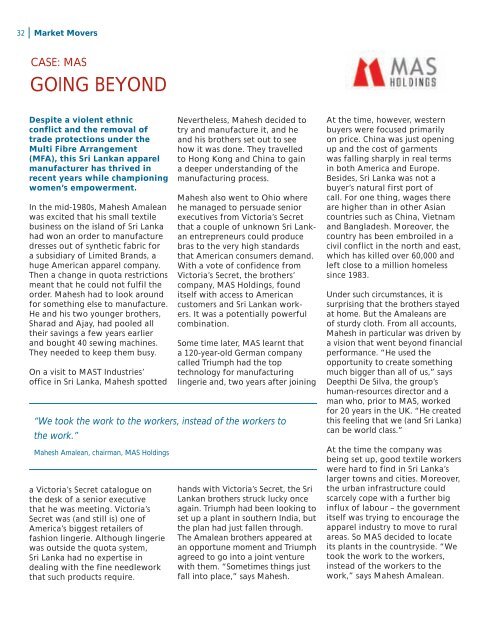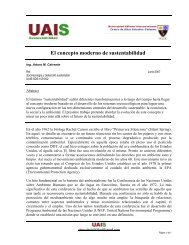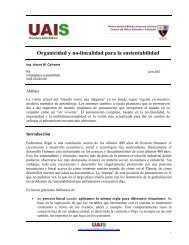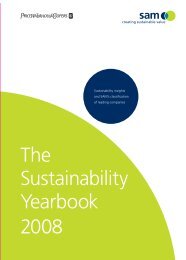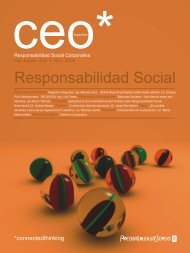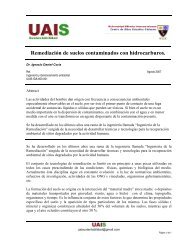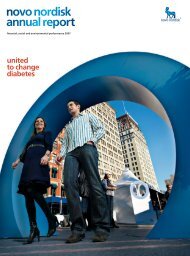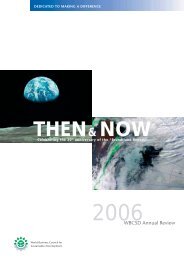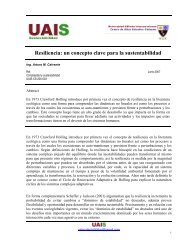Market Movers: Lessons from a Frontier of Innovation - IFC
Market Movers: Lessons from a Frontier of Innovation - IFC
Market Movers: Lessons from a Frontier of Innovation - IFC
You also want an ePaper? Increase the reach of your titles
YUMPU automatically turns print PDFs into web optimized ePapers that Google loves.
32<strong>Market</strong> <strong>Movers</strong>CASE: MASGOING BEyONDdespite a violent ethnicconflict and the removal <strong>of</strong>trade protections under theMulti Fibre arrangement(MFa), this Sri lankan apparelmanufacturer has thrived inrecent years while championingwomen’s empowerment.In the mid-1980s, Mahesh Amaleanwas excited that his small textilebusiness on the island <strong>of</strong> Sri Lankahad won an order to manufacturedresses out <strong>of</strong> synthetic fabric fora subsidiary <strong>of</strong> Limited Brands, ahuge American apparel company.Then a change in quota restrictionsmeant that he could not fulfil theorder. Mahesh had to look aroundfor something else to manufacture.He and his two younger brothers,Sharad and Ajay, had pooled alltheir savings a few years earlierand bought 40 sewing machines.They needed to keep them busy.On a visit to MAST Industries’<strong>of</strong>fice in Sri Lanka, Mahesh spottedNevertheless, Mahesh decided totry and manufacture it, and heand his brothers set out to seehow it was done. They travelledto Hong Kong and China to gaina deeper understanding <strong>of</strong> themanufacturing process.Mahesh also went to Ohio wherehe managed to persuade seniorexecutives <strong>from</strong> Victoria’s Secretthat a couple <strong>of</strong> unknown Sri Lankanentrepreneurs could producebras to the very high standardsthat American consumers demand.With a vote <strong>of</strong> confidence <strong>from</strong>Victoria’s Secret, the brothers’company, MAS Holdings, founditself with access to Americancustomers and Sri Lankan workers.It was a potentially powerfulcombination.Some time later, MAS learnt thata 120-year-old German companycalled Triumph had the toptechnology for manufacturinglingerie and, two years after joining“We took the work to the workers, instead <strong>of</strong> the workers tothe work.”Mahesh Amalean, chairman, MAS Holdingsa Victoria’s Secret catalogue onthe desk <strong>of</strong> a senior executivethat he was meeting. Victoria’sSecret was (and still is) one <strong>of</strong>America’s biggest retailers <strong>of</strong>fashion lingerie. Although lingeriewas outside the quota system,Sri Lanka had no expertise indealing with the fine needleworkthat such products require.hands with Victoria’s Secret, the SriLankan brothers struck lucky onceagain. Triumph had been looking toset up a plant in southern India, butthe plan had just fallen through.The Amalean brothers appeared atan opportune moment and Triumphagreed to go into a joint venturewith them. “Sometimes things justfall into place,” says Mahesh.At the time, however, westernbuyers were focused primarilyon price. China was just openingup and the cost <strong>of</strong> garmentswas falling sharply in real termsin both America and Europe.Besides, Sri Lanka was not abuyer’s natural first port <strong>of</strong>call. For one thing, wages thereare higher than in other Asiancountries such as China, Vietnamand Bangladesh. Moreover, thecountry has been embroiled in acivil conflict in the north and east,which has killed over 60,000 andleft close to a million homelesssince 1983.Under such circumstances, it issurprising that the brothers stayedat home. But the Amaleans are<strong>of</strong> sturdy cloth. From all accounts,Mahesh in particular was driven bya vision that went beyond financialperformance. “He used theopportunity to create somethingmuch bigger than all <strong>of</strong> us,” saysDeepthi De Silva, the group’shuman-resources director and aman who, prior to MAS, workedfor 20 years in the UK. “He createdthis feeling that we (and Sri Lanka)can be world class.”At the time the company wasbeing set up, good textile workerswere hard to find in Sri Lanka’slarger towns and cities. Moreover,the urban infrastructure couldscarcely cope with a further biginflux <strong>of</strong> labour – the governmentitself was trying to encourage theapparel industry to move to ruralareas. So MAS decided to locateits plants in the countryside. “Wetook the work to the workers,instead <strong>of</strong> the workers to thework,” says Mahesh Amalean.


